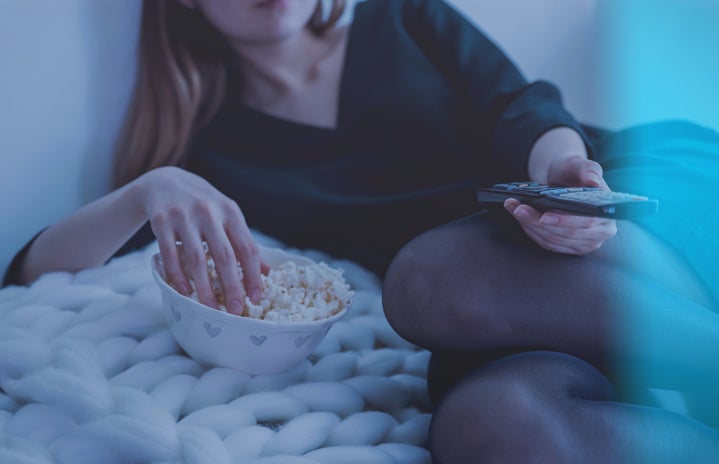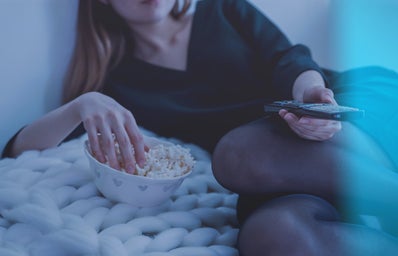Nostalgia and Chill
Let me set the scene for you. You’re just sitting down to watch a film with your pals, the hours of deliberation have paid off and you have reached a decision. You’ve prepared your snacks, made yourself comfortable and turned down the lights to create the perfect ambience. Just as the opening credits begin to dance across the screen you notice a light flickering in your peripheral, as you look to see where the light is coming from you see one of your friends is shamelessly tapping away at their phone, completely shattering the cinematic illusion. As you look more closely you see that they are not only on their phone, but they are also looking up the plot of the film. Absolute sacrilege! Well…I’m that friend.
This is not a new thing for me, in fact it’s something I have been doing for quite some time now. The thought of watching a film in which I don’t know what is going to happen is so terrifying that I now almost exclusively watch Disney films: 101 Dalmatians, The Aristocats, The Lion King, etc. Especially in the case of the latter, these films do have their stressful and tear-jerking moments, however, I have seen each of them about 47 times and therefore, am fairly well-equipped to deal with these scenes when they do arise. When I am forced to watch something new, I will always look up the plot. I am aware that this is an incredibly irritating tendency, the groans of annoyance from those who see me doing it do not go unnoticed. Unfortunately, it is not something that I seem to be able to help and I even think it has worsened over the past year.
In light of this, I decided to do a bit of research to see if anyone else was dealing with a similar problem and much to my relief I found I was in fact, not alone. A quick look through twitter told me that lots of people have found themselves reaching for comfort classics more and more this year, not just in the Christmas period when we have our annual, obligatory viewings of Love Actually, Elf, The Polar Express or whatever tops your Christmas watch list. I also found that this is actually a phenomena that has been a topic of research for psychologists.
Humans, are not strangers to repetition and this repetition takes on many forms. Habits, like biting your nails, are reflex actions that happen without you thinking about them. Addiction, like smoking, is a physical dependence that lacks rational motivation, forcing you to repeat actions. Rituals, like using a lucky pen in an exam, are episodic, expressive, symbolic activities. However, these do not compare to the voluntary act of re-watching a film or re-reading a book. Researchers Cristell Antonia Russell and Sidney Levy discovered this when conducting an experiment interviewing people in order to understand reconsumption experiences (“the term reconsumption refers to consumption experiences [in this case films] that consumers actively and consciously seek to experience again”).
They found a multitude of reasons that people desired to watch the same films. Firstly, a genuine like of the material. Secondly, for nostalgia purposes, this can be a general lamentation of times gone by, or a desire to return to a particular point in our own lives, even just in memory. The third reason was “existential understanding”, the notion that reengaging with old films and books “allows a reworking of experiences as consumers consider their own particular enjoyments and understandings of choices they have made.” The fourth reason was “emotional regulation”. This describes the comfort we feel in re-watching films because we know how it is going to end.
I think it is this fourth reason, “emotional regulation” that has caused an increase in people re-watching films this year in particular. Dr. Pamela Rutledge, a psychologist and director of the Media Psychology Research Centre, states that “watching the same movie reaffirms that there is order in the world”. This is definitely something that people have been in search of. The uncertainty that the pandemic, economic and political climate have fostered in the past year, makes it is unsurprising that seeking further suspense is low on our priority list. Rutledge places this concept in the context of humanity, explaining how, “our primitive brains are hardwired to keep us safe, so the unknown future can cause anxiety. Knowing a film’s outcome creates a sense of safety and therefore comfort on a primal level.”
While I envy those who can throw all caution to the wind in such a blasé manner, I personally would not take such a risk as to wait for events on screen to unfold to understand the ending of a film. It is comforting, therefore, to know that my complete aversion to broadening my cinematic repertoire, without the helping hand of trusty Wikipedia, is in fact, good old human nature. Much to the dismay of my fellow film watchers, this has given me new confidence to continue my antics. For those of you like me, keep doing you – there is no shame in being a little prepared.



